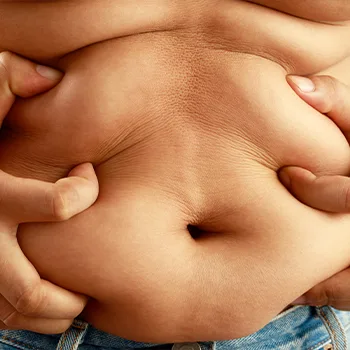From my experience as a personal trainer, I understand that belly fat is more than just a nuisance causing your clothes to feel tighter; it's a health concern that needs attention.
While it's common to link weight gain with aging, there are numerous factors that can contribute to an expanding waistline.
In my research, which involved extensive review of journals and articles, I've compiled valuable insights and identified 11 factors that can lead to excessive weight gain.
Let's dive into these factors.
Quick Summary
- A significant cause of belly fat is the consumption of sugary foods and beverages, which contribute to weight gain and fat accumulation.
- To reduce belly fat, it's important to understand and address factors such as poor diet, lack of exercise, and genetic predispositions.
- According to the National Institute of Health, excessive subcutaneous fat increases the risk of heart disease, type 2 diabetes, and some cancers.
- In my opinion, effectively managing belly fat requires a holistic approach, combining dietary changes, increased physical activity, and stress management.
Types of Belly Fat

Everyone has belly fat, even the slim ones.
It's either subcutaneous (under the skin) or visceral (deep in your abdomen).
Subcutaneous fat, the soft kind around your waist, is more common in women.
According to the National Institute of Health (NIH), too much of it ups the risk of heart disease, type 2 diabetes, and some cancers [1].
The more dangerous type, visceral fat, wraps around vital organs like kidneys and liver, and is a big red flag for diabetes and liver disease.
11 Causes of Belly Fat

Here are some activities, foods, behaviors, and body conditions you can lower to prevent weight gain:
1. Sugary Foods and Beverages
I often see clients unaware of how much added sugar they consume daily.
According to WebMed, added sugar is found in baked goods, muffins, pastries, flavored yogurt, breakfast cereals, sugar-sweetened beverages (SSBs), and other processed foods [2].
Sugary drinks, being affordable and convenient, are a major source of this sugar overload. For a healthier diet, I advise moderation with sugary products and recommend water, unsweetened drinks, or milk as better choices.
2. Poor Diet
Protein-rich foods like lean meat, poultry, eggs, beans, and lentils keep you full longer, boost muscle repair, and ramp up metabolism, helping in weight loss.
Skipping lean protein could lead to overeating and weight gain. Swap out high-fat snacks like cookies and fries for healthier options like broccoli, apples, and brown rice to cut down on saturated fats.
A diet lacking essential nutrients and heavy on processed, high-calorie foods can pack on pounds. By choosing nutrient-dense foods, you'll manage your weight better and boost overall health.
3. Trans Fats

I always caution my clients about trans fats due to their health risks.
These fats, according to NIH, primarily produced by hydrogenating unsaturated fats, are known to increase dangerous visceral fat [3].
I recommend eliminating trans fat in your food by using oils high in polyunsaturated fats, avoiding fast and fried foods, and opting for meats with low trans fats, such as chicken, lean pork, beef, or fish rich in omega-3s.
4. Lack of Physical Activity
Living a sedentary lifestyle can increase your risk of excessive weight gain. Unfortunately, 80% of adults don't engage in resistance training despite living sedentary lifestyles.
If you spend most of your days sitting behind a desk, you should engage in regular physical exercise and limit your sitting time to lower your health risks.
5. Alcohol
Alcohol contributes to obesity or beer belly, especially among men.
Beer belly decreases as you shed abdominal fat. So after reducing your beer consumption, eat more healthily, count calories, and consume more vegetables for sustainable results.
6. Stress

I've noticed clients more sensitive to stress hormones tend to accumulate belly fat.
Stress leads to cortisol release, which can throw off your metabolism.
If you find yourself stress-eating, that extra belly fat is likely to linger.
My advice? Regular exercise, relaxation techniques, and proactive mental health management are key to tackling this issue.
7. Menopause
Estrogen restrains body fat distribution in women around the hips and thighs in preparation for pregnancy. When menopause occurs, their estrogen levels drop drastically.
This means fat will now get stored in the belly rather than the hips and thighs. To shed menopausal fat, consider aerobic exercises like swimming, walking, biking, and running.
8. Genetics
Genetics can also influence where your body stores fat. If your family has a history of insulin resistance, high blood pressure, and cardiovascular diseases, you may have a tendency to accumulate abdominal fat.
To combat belly fat caused by genetics and for overall disease control, try consuming protein and fiber-rich diets and reduce calorie intake.
9. Poor Sleeping Habits

If you get low-quality sleep of less than six to seven hours a day, you might gain excess body mass. Sleep deprivation can also lead to unhealthy eating behaviors or emotional eating.
On the other hand, increased sleep duration can help improve your digestion and enable you to make better food choices. It also prevents late-night snacking and allows you to burn more calories.
10. Gut Bacteria
According to NIH, having a higher ratio of firmicutes bacteria to Bacteroidetes can lower the increased risk of developing obesity, type 2 diabetes, and heart disease [4].
You can take probiotics to help you reduce the amount of fat absorbed in your body and increase appetite-reducing hormones, which can help you burn calories and fat.
11. Smoking
According to ScienceDirect, researchers have found that cigarette smoking increases abdominal obesity [5]. It pushes fat into central areas, which leads to pot bellies and protruding tummies.
Their medical advice highly suggests quitting smoking to reduce your increased abdominal fat and the risk of getting diabetes. If you have diabetes, your blood sugar control might also increase.
Hormonal Imbalances and Belly Fats
Hormonal imbalances, prevalent in Polycystic Ovary Syndrome (PCOS) and thyroid disorders, contribute to abdominal fat accumulation.
Both conditions disrupt the delicate hormonal balance, fostering an environment conducive to abdominal fat deposition and making weight management challenging for those affected.
Polycystic Ovary Syndrome (PCOS)
In PCOS, elevated insulin levels stimulate the ovaries to produce excess androgens, fostering fat deposition in the abdominal area.
Additionally, insulin resistance in PCOS impedes efficient glucose utilization, promoting fat storage.
Thyroid Disorders
Thyroid disorders, such as hypothyroidism, lead to a sluggish metabolism, hindering the body's ability to burn calories effectively.
This metabolic slowdown encourages fat accumulation, particularly in the abdominal region.
Ways to Lose More Belly Fat

If you want to lose abdominal fat fast, you must change your diet and other unhealthy habits.
“How you lose fat may be just as important as how much fat you lose,”
- Dr. Samuel Klein, Professor of Medicine & Nutritional Science at Washington University School of Medicine
Here are some things you can do to enhance weight loss:
- Drink a lot of water
- Reduce carbs
- Get enough sleep
- Eat breakfast for losing belly fat
- Increase protein intake
- Take walks and crunch exercises
- Rest for six to seven hours
- Add fiber to your diet
FAQs
What Food Causes Increased Belly Fat in Females?
In women, the most common abdominal fat causes are fatty foods such as butter, cheese, and fatty meat. Eating excess calories of any kind can also increase your waistline and abdominal fat.
How Long Does It Take To Lose Belly Fat?
If you're keen on your diet and determined to lose weight, you can start to see results in two weeks. However, you must burn about 3500 calories to lose one pound. So, take that into account when optimizing your diet for faster results.
References:
- https://www.ncbi.nlm.nih.gov/pmc/articles/PMC5522762/
- https://www.webmd.com/diet/lose-weight-fast
- https://www.ncbi.nlm.nih.gov/pmc/articles/PMC3551118/
- https://www.ncbi.nlm.nih.gov/pmc/articles/PMC7285218/
- https://www.sciencedirect.com/science/article/pii/S2211335516300638
About The Author
You May Also Like






